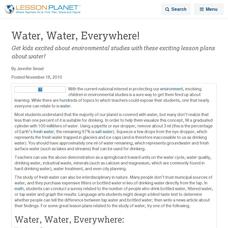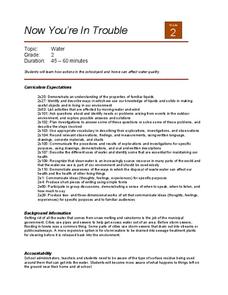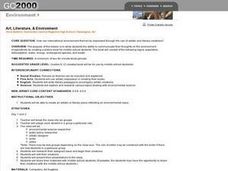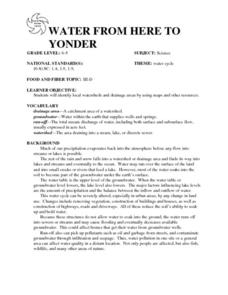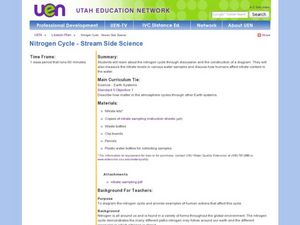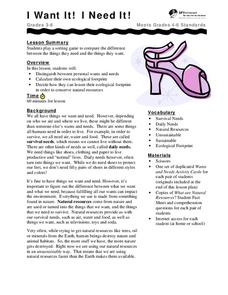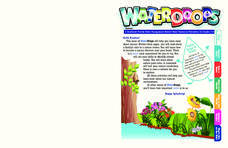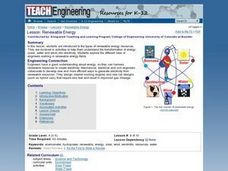Curated OER
Watershed Tourist
Young scholars recognize and categorize different bodies of water. In this watershed and water environments lesson plan, students "Follow the Water from Brook to Ocean." Young scholars define the different bodies of water and sort from...
Curated OER
Water, Water, Everywhere!
Get kids excited about environmental studies with these exciting lesson plans about water!
Curated OER
Aquatic Science and IPC
Students explain the importance of water in our daily lives. In this aquatic science lesson, students identify different ways to purify water and make it potable. They design and construct a water filter based on researched information.
Curated OER
Now You're In Trouble
Second graders study how actions in the schoolyard and home can affect water quality. They discuss how rainwater can clean plants and sidewalks on its way to storm sewers. They draw an example of a simple maze that represents the maze...
Curated OER
Farming Number 6
In this environment worksheet, students identify and explain the importance of water and farming. They identify the differences between food items and whether they are a fruit, vegetable, or animal. Students also respond to 5 yes/no...
Curated OER
Local Hydrologic Cycle
Students draw the water cycle as it occurs in their community. In this water cycle lesson, students observe demonstrations of sublimation and infiltration. They also use photographs or their own drawings of their...
Curated OER
'Round and 'Round it Goes!
Students discuss and interpret background knowledge on poster copy given on the water cycle. Students complete the included activity sheets using the poster as a reference in small groups. Students identify and name where water can be...
Curated OER
Art, Literature, & Environment
Students communicate their thoughts on the environment by creating picture books for middle school students. Students include their thoughts on population, deforestation, water, energy, endangered species, and waste in their picture...
Curated OER
Keep the Environment Clean
Students discuss ways our environment becomes polluted. They make a list of ways to keep it clean.
Curated OER
WATER FROM HERE TO YONDER
Students identify local watersheds and drainage areas by using maps and other resources. They are given copies of the water cycle. Students discuss the movement of water in the environment. They observe, record and transfer information...
Curated OER
The High Cost of Chemical Dependency
Sixth graders explore, analyze and study the effect and impact that humans have on the environment based on their choices as individuals, businesses and governments. They assess the balance between human activities and aquatic pollution.
Curated OER
Nitrogen Cycle-Stream Side Science
A thorough background and nitrate sampling lab sheet are provided to share with your young scientists. After discussing the nitrogen cycle with the class, you will break them into small groups and show them how to use their inquiry...
California Academy of Science
Coral and Chemistry
Using cabbage juice as a pH indicator, future scientists explore the effect of increasing carbon dioxide on the pH of the ocean and relate it to the health of coral reefs. Ideal for an earth or environmental sciences course, this lesson...
Alabama Learning Exchange
Make a Difference!
We are very dependent upon other life forms around us to survive. Here, scholars explore relationships in the ecosystem with the help of Auntie Litter and the pollution patrol. They imagine a world without grass, making connections to...
City and County of San Francisco
I Want It! I Need It!
Discuss wants and needs with your elementary ecologists and get them to consider what would happen to our natural resources if we all got everything that we want. Learners play a card sorting game and take an ecological footprint quiz on...
Virginia Department of Education
Freshwater Food Chains
What's in the water? Encourage your class to further explore this question and learn about pond ecosystems, food chains, and food webs as they complete this hands-on activity. They view the environment from a new perspective...
NOAA
Stressed Out!
Are our oceans really suffering due to the choices humans make? The sixth and final installment in the volume of activities challenges research groups to tackle one of six major topics that impact ocean health. After getting to the...
Curated OER
Human Activity and the Environment 2004
Students brainstorm the ways we use energy sources in our daily lives and what our lives would be like without it. They answer questions based on sections from the Human Activity and the Environment 2004, "Energy in Canada" article.
Curated OER
Ecological Impact of River Dams
Students investigate their environment by completing an in-class experiment. In this ecological lesson, students define the roles of dams and how electricity is created by them. Students utilize plastic jugs, sand and tap...
Curated OER
Splish, Splash, I was Takin' a Bath!
Students explore the causes of water pollution and its effects on the environment through the use of models and scientific investigation. In the accompanying activities, they investigate filtration and aeration processes as they are used...
Curated OER
Waterdrops
In this environment worksheet, students read an article about water drops and the nature center. They pretend that they are going to a nature center and write what they would hope see there. Students also identify living things and...
Curated OER
Salt Marsh in a Pan
Students create a model of a salt marsh to discover the impact of pollution and human activities on water-based habitats including bays and the ocean. They recognize the relationship between natural and developed areas. Students impact...
Curated OER
TE Lesson: Renewable Energy
Young scholars examine renewable energy sources such as solar, water, and wind. They experiment to determine how renewable energy is transformed into electricity. They investigate the role of engineers who work in the field of renewable...
Curated OER
Pollution is Not a Solution
Students explore the environment by completing science worksheets in class. In this water conservation activity, students identify ways water is used in our society and how we abuse the privilege. Students discuss methods to reduce water...



